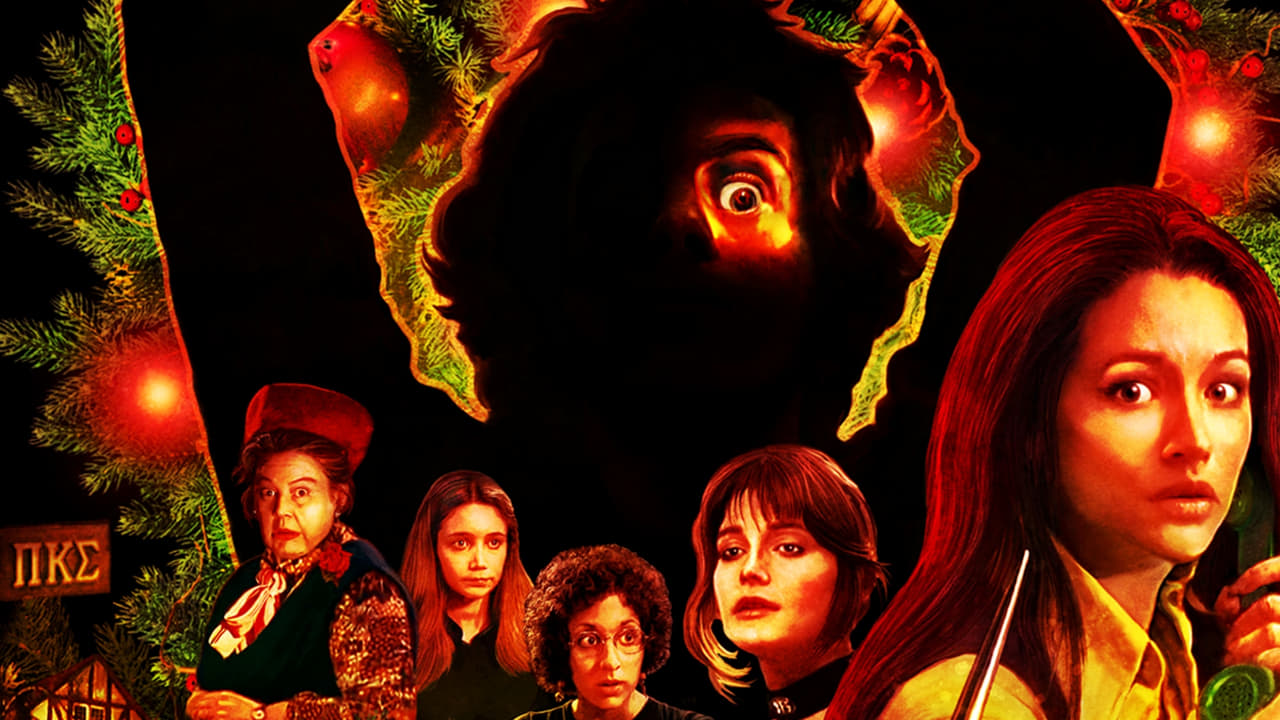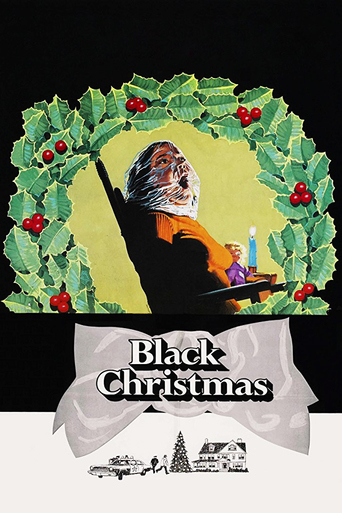

Black Christmas is brilliantly simple: a stalker terrorizes a sorority house. That simplicity allows it to really dig into the disturbia more specifically and vividly. The intensely unnerving phone calls. The repeated imagery of the plastic-wrapped suffocation. The blur of Christmas lights punctuating the dark scenery. It's brutal '70s horror, but not without some nice splashes of levity to keep everything fresh (the dumb cop is classic).
... View MoreI first saw this on a VHS in the late 80s. Revisited it recently on a DVD. Plot - A group of sorority sisters are receiving threatening phone calls, they r stalked and murdered during the holiday season by a deranged murderer. Black Christmas was a bit ahead of its time by using the subject of abortion as one of the main stories in the film. Also a lot of the killers movements are filmed in a point of view style. It was also a first horror film to have its villain use phone calls as a way to terrorize its victims. This movie also has an open ending without revealing or pondering much bah the killer. Also it is notable for "the calls r coming from the house" revelation. Now coming to the flaws, the movie is very slow paced. The editing n cinematography is not upto the mark. The kills r minimum n most of it r lousy n not at all scary. The tension was lacking. On the contrary the remake had some brutal death scenes.
... View MoreThe movie starts out with a prowler/killer approaching the Phi Kappa Sigma Sorority house. The girls are throwing a Christmas party, they have no idea that a stranger has gotten into the house. Later that night, they start getting strange phone calls from a guy using 3 different voices. One is a perverted voice, the other Billy; and someone named Agnes. Barb( Margot Kidder) answers the phone, and she just laughs it off like who cares. Claire ( Lynne Griffin) who is leaving for the break to meet her father, doesn't take it lightly, leaves to finish packing upstairs. While packing she is suffocated with a plastic bag, and taken up to the attack. When Claire's father comes the next day and explains she didn't show up; red flags are raised. Jess( Olivia Hussey) gets Barb, and Phil(Andrea Martin) to file a report at the police department. The first time they go the Desk Sgt. Nash( Doug McGrath) doesn't take it seriously. When a girl is murdered in the park close by and the calls are still happening, Lt Ken Fuller(John Saxon) gets involved. The calls still come and this time they seem personal like only someone close to her would know.Jess, has her own problems, especially how will she tell her boyfriend Perter(Keir Dulla) she's pregnant. She goes to the conservatory, and tells him she wants an abortion. When she tells him he flips, he is high strung and orders her around. He's control freak who is threatening; and could go off like a firework . When Jess gets back she gets another call, and it sounds so much like Peter; that it's chilling. Peter is weird he sneaks in the house to take a nap, and approaches Jess like a creep. When I first saw this movie I thought Peter was the killer, but who's Billy? While watching this movie I notice that the killer wears the same clothes Pete wears. I also think he and the killer look alike, i.e. when Barb gets killed the killer resembles him to a T. I do think he made some of the calls from the upstairs phone; because he was in the house at the time she receive one.That one she got got the phone company involved. When Jess was on the phone to the police Peter started down the stairs. Jess had no idea he was there; and too me that's a little unnerving.When a tap is put on the line on the two phones downstairs. Lt Fuller and lineman Graham(Les Carlson) tells Jess in order to catch the person, she needs to keep them on the line. Phil has a talk with Jess before she goes to bed. Jess thinks it could be Peter, but isn't sure. Phil gives her some advice, then goes to bed. Ten minutes later a call comes in, and they get the location. Sgt. Nash phones Lt. Fuller and tells him the calls are coming from inside the house. When Nash calls Jess and tells her the news, she warns Barb and Phil. When she discovers they have been murdered, and the killer is still in the room. Jess fights back and escapes to the basement. It's about two minutes later, Peter shows up and knocks on the basement window. He eventually gets in, but Jess doesn't trust him. She ends up killing him with a fire poker. Afterwards when they find Jess, people in the background think he is the killer or is he? I loved this movie especially the joke on Sgt. Nash. One thing this move has in it is a little comic relief, especially the Fellatio joke on Nash. There were others, but that one had me going for awhile.I didn't see this movie until after the re-make came out, the original is always the best. Too me I think there could have been two killers Peter and Billy. Peter was just so creepy, and was always around when someone was killed. The whole sneaking in the house to take a nap; WTF-WHO DOES THAT/? This is a fact, this movie is a must see. If this movie doesn't give you the creeps, check your pulse.
... View MoreIt's the night before Christmas Eve at a campus sorority house when the phone rings. The muffled breaths of the caller can be heard on the other end. Soon, heavy breathing turns into lascivious outbursts, cries that egg on Barb (Margot Kidder) while unsettling the rest. Soon, nobody can find Clare (Lynne Griffin), which leads her father (James Edmond) to contact the police, lead by Lt. Fuller (John Saxon). With the disturbing calls continuing into Christmas Eve, and Jess' (Olivia Hussey) boyfriend upset, it soon becomes evident that there's more to the night than just carol's and Christmas lights.When an unsuspecting world received Black Christmas, the term and sub-genre slasher wouldn't insert itself into the mainstream canon for another 4 years. Pre-dating John Carpenter's Halloween, the aforementioned cannonball to the eyes of American cinema, our film aptly embraces the first person perspective alarmingly introduced with such films as Peeping Tom and Psycho. While the former, Michael Powell's compellingly voyeuristic tale, ultimately ushered in the perspective that would end up widely used in the genre, it wasn't until Bob Clark's holiday slasher that we would see its use popularized in film.What Black Christmas does exceptionally well is assert an uncomfortable gaze over its viewer, one that helps peel backs its grainy, exploitative layer with a razor sharp masculine fixation on the female body. We witness the sorority house from afar, only getting closer as our peeping tom does. Even when we're invited in before he climbs through an upstairs window, it's always through the perceived eyes of our voyeur. The masculine gaze controls much of our perception as he slowly preys on the sorority sisters, a light cascading across a peering eye. When Claire is strangled, her body is propped up by a window with her eyes peering out and mouth agape, echoing the sexually deranged moans of our caller.It's these perverse and sexually driven calls that push our film forward, filling every frame with tension on what we already know. Bob Clark frames the horror with staircases, doorframes and windows, utilizing these as the eyes of our killer. While we don't know who it is, we know where he is; yet this understanding only adds increased value to the terror that presses down on us. It's a pressure that weighs so heavy it rests in our stomach, a feeling Jess carries with her as she tells her boyfriend Peter (Keir Dullea) of her pregnancy and impending abortion. When he tells her what she can and cannot do with her own pregnancy, he stares at her with the same fixation as our killer.Writer Roy Moore plays between the killings and a male-dominated state of mind with a juxtaposition that reverberates even more so today. Peter tells Jess that she can't kill the baby, while she never implies that it's a baby nor uses the word kills. We then shift back to the sorority house, a home that is devoid of male governance, save for the looming eyes of our intruder. The dominating male gaze echoes the dominating male voice that pushes Jess away, further into our place of murder. These transitions spur on the ominous dread that hangs in the air as each kill unfolds, our now final girl clinging to a hope we know doesn't exist.The world that Bob Clark and Roy Moore bring to life is reminiscent of its time, yet mirrors those that we live in today. Its morally strong lead, and similarly dueling views, both literally and symbolically, helped usher in the sub-genre that films like Silent Night, Deadly Night and Night of the Demons would inevitably destroy in the years to come. Black Christmas works as a powerfully affecting, unsettling piece of pre-slasher filmmaking that establishes itself as an important piece in horror cinema.
... View More